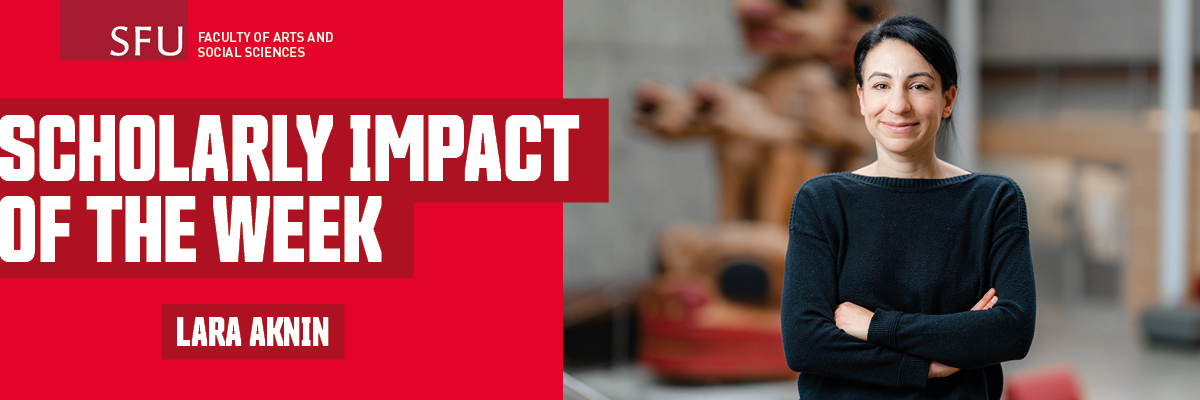
The COVID-19 pandemic had upended lives in countless ways and its effects continue to reverberate through society. Researchers across the psychological sciences have amassed vast amounts of data on how the ongoing distress, isolation and uncertainty of the pandemic has affected mental health.
Distinguished Simon Fraser University (SFU) Professor of psychology Lara Aknin is Chair of The Lancet’s Mental Health & Wellbeing Task Force, an international team of researchers providing expertise and recommendations on pandemic response and recovery relating to psychological wellbeing. The group is part of The Lancet’s COVID-19 Commission gathering insights into the scope and consequences of the global health crisis.
The task force wanted to know if psychological distress, self-harm, subjective wellbeing and loneliness had changed during the first year of the pandemic as well as the factors predicting greater risk or protection in these areas. They also sought insights into the type of experiences and behaviours associated with better or poorer mental health during this time. Their findings are outlined in Mental Health During the First Year of the COVID-19 Pandemic: A Review and Recommendations for Moving Forward.
Reviewing high-quality cross-sectional and longitudinal studies from more than 20 countries around the world, the task force found that anxiety, depression and distress increased dramatically in the early months of the pandemic but then declined to near pre-pandemic levels. Meanwhile, suicide rates, life satisfaction and loneliness remained largely stable throughout the first year.
The task force also published a subsequent study in The Lancet Public Health investigating the relationship between COVID-19 policy stringency and mental health in 15 countries between April 2020 and June 2021. Findings indicated that greater COVID-19 policy stringency was associated with lower mental health, but this association was small. Looking across countries, the authors found that those aiming to eliminate COVID-19 community transmission within their borders (such as Australia, Japan and Singapore) required lower than average levels of policy stringency, experienced fewer deaths and cases, as well as better mental health trajectories than countries aiming to mitigate COVID-19 (such as Canada, France and the U.K.). Eliminating countries used early, targeted restrictions that included closing their borders to international travel. Measures restricting social connections were associated with greater psychological distress and a lower opinion of the government when compared with countries where freedoms within their borders were less restricted.
Based on their findings, the Mental Health Task Force recommends several ways to support psychological health now and beyond the global health crisis.
We spoke to Professor Aknin about her research.
The research suggests that that the first few months of the pandemic were the most stressful for people, but less stressful into mid-2020. Why do you think that early anxiety leveled out? Based on your ongoing research, are people still experiencing high levels of anxiety?
It is likely that many factors were at play. By mid-2020 the weather was improving in the northern hemisphere, which allowed more time and safe socializing outdoors. Around the same time, COVID-19 policy restrictions were easing in some countries. Also, many people may have found ways to cope and adapt to the uncertainty and life changes that the pandemic inspired. There are some people who faced (and are still facing) significant mental health strain during the pandemic, but our review suggests that there was also a significant degree of resilience.
What are some of the factors that predicted greater risk of psychological distress and loneliness during the pandemic?
One interesting finding emerging in our review of the evidence is that the COVID-19 pandemic introduced new risk profiles for mental health concerns. While some predictors of poorer mental health from before pandemic remained—such as lower income—new risk factors included being younger, identifying as female and having children under the age of five at home.
What are some of the factors that provided protection against psychological distress and loneliness?
Certain experiences were reliably associated with better or worse mental health during the first year and half of the pandemic. Some experiences associated with greater mental health challenges were greater proximity to COVID-19 illness, economic strain, exposure to COVID-19 media and news, as well as childcare. Meanwhile, time spent gardening, outdoors in nature, reading, volunteering and exercising was associated with better mental health.
Based on the insights from the research, can you outline your recommendations to support mental health now and beyond the pandemic?
In our first paper, our Mental Health Task Force proposed seven recommendations to support mental health during the pandemic and beyond. The first recommendation is to invest in more large-scale research on the nature, treatment and consequences of living through the pandemic. We also suggested more support and monitoring for COVID-19 patients and individuals with a large burden of care—such as teachers and nurses—as well as prioritizing access to safe childcare and elementary school.
In the longer term, we recommend proactive support for mental health care, such that people have easy access to evidence-based mental health services, just as they do for physical health care. In addition, we suggesting making online mental-health therapy widely available and supplemented with in-person support; promoting well-being efforts at work, schools, and in communities; and embedding mental-health care and promotion within all social systems.
For more information on Professor Aknin’s work on the factors that contribute to wellbeing visit the Helping and Happiness Lab.
SFU's Scholarly Impact of the Week series does not reflect the opinions or viewpoints of the university, but those of the scholars. The timing of articles in the series is chosen weeks or months in advance, based on a published set of criteria. Any correspondence with university or world events at the time of publication is purely coincidental.
For more information, please see SFU's Code of Faculty Ethics and Responsibilities and the statement on academic freedom.